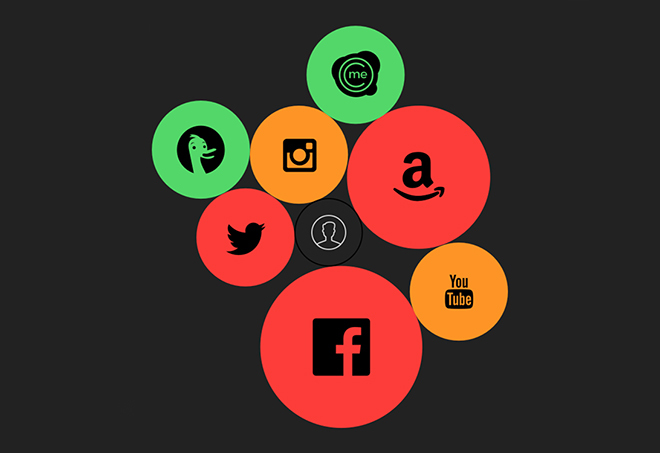Personal data: can not be sold?

Hi, Habr. Today we want to bring to your attention the translation of one very interesting article, in which a very ambiguous topic is raised. It's no secret that all kinds of corporations and social networks constantly collect various information about their users and visitors, including the logs of their behavior on the network.
Every our action is recorded continuously, both online and, often, offline. Subsequently, these data are analyzed and used by all interested parties, including with a profit. Social networks and advertising agencies earn us, but we do not have the slightest benefit from this.
Unfortunately, the Internet does not forget anything. Everything that got into the network will almost certainly remain in it forever. Do not even rely on the "forgetfulness" of social networks and search engines, they do not destroy the data, they only accumulate them. Many offline companies distribute the personal data of their customers: it is worth leaving your phone number in some form, after a while advertising SMS and calls from completely different offices will fall down. Alas, in the modern world there is no place left for such things as confidentiality and the elementary rules of decency regarding the dissemination of personal information. This has led to the fact that there are more and more supporters in the world of legislative recognition of the “right to be forgotten”. This term means the procedure of forcibly removing any information about a person from the search results, if these data are no longer relevant and damage the reputation. Imagine that you, for example, went bankrupt 15-20 years ago and sold off your property. Since then things have improved, you have risen to your feet and started life from scratch. But to this day, when you enter your name in a search engine, one of the first will be a message that you went through the world. Unpleasant, right?
')
European politicians have recently actively joined the fight for the “right to be forgotten”, and now they are beginning to put pressure on Google, demanding that some data be removed from search results. So far these are isolated cases, but the first step is the first. Perhaps this is one of the first cases in history when the aspirations of politicians and ordinary citizens coincided. In this case, officials are driven by the desire to limit the dissemination of information about their unseemly, from the point of view of potential voters, actions. But the essence is the same - no one wants the unpleasant details of his life to always come out on the first page of Google or Yandex.
In another way, domestic legislators have gone. The scandalous law requiring the storage of personal data of Russians exclusively on Russian servers has been taken hostile by the public.

Since someone is cashing in on us anyway, why not pinch a piece of this financial pie? And the first steps in this direction have already been taken: the Citizenme startup has developed an application that installs on a smartphone and collects various information about its owner, which then ... can be sold.
The authors of the project have set their long-term goal to create a convenient mechanism for selling information about our own activity directly to those companies that we choose independently. The tool for collecting and analyzing data is a mobile application that is connected to the owner’s accounts in various social networks. At the same time, the authors of the project, in the first place, try to warn people in this way, to help them understand what data is being collected about them and how they are used.
Despite the annoying abundance of advertisements found on the network’s open spaces, it is the breeding ground for the Internet; thanks to advertising, it becomes possible to finance a huge number of online projects. However, the policy of aggressively collecting user information has made people mistrustful. And the authors of Citizenme hope that their offspring will allow users to take control of the process of collecting information about themselves.
How it works
 First you need to register in the application all your accounts in social networks. This data will be stored only on the smartphone, and not on the Citizenme server. At the moment, the application supports Facebook, LinkedIn and Twitter, other social networks will be added later.
First you need to register in the application all your accounts in social networks. This data will be stored only on the smartphone, and not on the Citizenme server. At the moment, the application supports Facebook, LinkedIn and Twitter, other social networks will be added later.This is clearly reflected information about you, which is shared, so you can fine-tune the security settings in each of the social networks. Moreover, the appendix contains information that details the nuances of the service policy of each of the supported systems. The most important settings, for example, Facebook's rules for using your photos and other content, are highlighted in red. And when companies change the terms of use, Citizenme warns you about it and gives you the opportunity to give your assessment. True, this is a completely symbolic function.
The authors of the project together with the University of Cambridge have developed a series of tests that allow you to understand how different social networks analyze your data. For example, an application can predict your political preferences in terms of a particular resource. If this is not too useful, then at least curious, and allows you to understand why you are shown this or that advertisement.
Future plans
Now the application is developed only for iOS, but next month, the authors plan to release a version for Android. The developers intend to cover all operating networks and, with your consent, collect much more information, including location, statistics from fitness trackers and much more. This, at a minimum, will allow you to learn a lot about your digital portrait that advertisers are targeting. Well, at the same time allow you to sell more data about yourself.
In order to build transparent relationships with their users, the developers are going to lay out the full codes of the client application and, possibly, the server one. It is also planned to create an independent non-profit organization that will monitor all changes in the conditions of use of the application. This step will also be aimed at gaining the trust of users who can vote for each innovation.
Financing of the project will be carried out at the expense of the commission from the profit received by users from the sale of their data. If you do not want to "trade by yourself", then you will need to pay a subscription.
Big Question

Probably, you have once asked him yourself, reading this material: will anyone even want to sell information about themselves? The authors of the project are confident that there will be anyone. According to the founder of the project, users can be divided into two large groups. The first includes older people who need complete control over information about themselves on the network, and who will happily pay for a subscription. The second group is made up of young people who do not attach importance to the dissemination of information about themselves and prefer to make money on it.
Also, developers emphasize that making a profit and tracking their data on the network are not the only uses of their application. For example, you want to purchase a car, and by publishing your intent to social networks, you will soon begin to receive promotional offers and information about discounts on cars. And Citizenme will allow to precisely control such activity and dispense information. In this case, all parties will be satisfied: advertisers will receive point-verified data about a potential client, and the user will save on the acquisition. The ecosystem benefits from all sides.

I must say that Citizenme is not the first attempt of this kind. The Attention Trust, a non-profit organization that has already ceased to exist, tried to develop a tool for collecting and selling data back in 2005 . But it seems that this attempt is somewhat ahead of time. Today, smartphones and social networks have become ubiquitous, and the amount of data collected on the Internet has increased many times. Therefore, the authors of Citizenme are optimistic about the future of their application.
Who knows, maybe soon there will be whole markets and exchanges for self-trading data about yourself. And if now we are talking about the sale and control of your data published on the network, then the next logical step would be to add the “information tracker” function. It is quite possible that such information trackers will soon become just as popular as fitness trackers.
However, a number of users will not want to sell anything and will prefer to limit the collection of data about themselves as much as possible. And they will need to offer tools for such protection. Such mechanisms are worked out in Yota Devices within the framework of the so-called concept of “safe smartphone”. We will tell about it in one of our following publications.
Source: https://habr.com/ru/post/230531/
All Articles